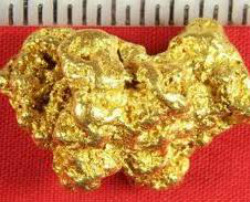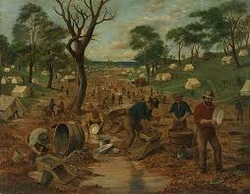 blogs.telegraph.co.uk
blogs.telegraph.co.uk Ghana's police have arrested at least 55 West Africans suspected of illegal gold mining, an immigration spokesman has told the BBC. The authorities plan to deport the suspects. More than 200 Chinese workers would be repatriated after their arrest last week.
Ghanaian law prevents foreigners from working in small-scale gold mines. Ghana is Africa's biggest gold producer after South Africa.
The raids are popular with many poor Ghanaians who feel that foreigners are taking jobs from them.
At least one of these companies is at loggerheads with the government over the deportations. The company insists that all its workers have valid permits, and alleges that members of the security forces have stolen goal during raids on its property this year.
 www.goldnuggetsales.com
www.goldnuggetsales.com The gold rush in Australia attracted adventurers from all around the world. The majority of these new arrivals were British but also included Americans, French, Italian, German, Polish and Hungarian exiles. The largest foreign contingent on the goldfields was the 40,000 Chinese who made their way to Australia.
 commons.wikimedia.org
commons.wikimedia.org Many years ago, I lived in Robe, South Australia. The house my family and I lived in was built mainly to cater to the Chinese migrants, who landed in the safe harbor there before they made the trek into Victoria to find gold, thus avoiding taxes. These poor workers bought biltong (dried meat) to carry with them. Back in the 1850's, the front room of the cottage served as a butcher shop. The living quarters at the rear consisted of a main room with a fireplace at one end and a kitchen. They used the 6ft round tank outside to tan hides.
I'm connected to those gold rush days. My great-grandmother worked in the kitchen at the local Robe Hotel at that time. Fate took my family back to the beautiful lobster-fishing town. Six degrees of separation is the theory that everyone and everything is six or fewer steps away, by way of introduction, from any other person in the world. I guess it could also be applied to events in history.
Do you have any stories about gold rush days?

 RSS Feed
RSS Feed






